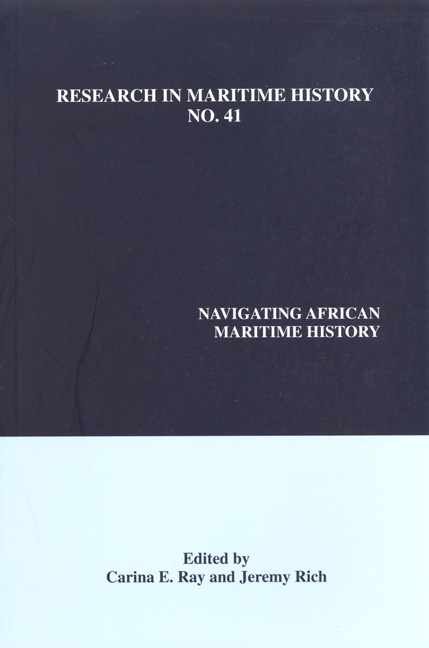Book contents
- Frontmatter
- Table of Contents
- About the Editors
- Contributors' Notes
- “Introduction: Charted Routes and New Directions in the Study of Africa's Maritime History”
- “Austronesian Mariners and Early Trans-Indian Ocean Crossings”
- “Eight Hens per Man per Day: Shipwreck Survivors and Pastoral Abundance in Southern Africa”
- “State Control and Regulation of Commerce on the Waterways and Coast of Senegambia, ca. 1500-1800”
- “Swimming, Surfing and Underwater Diving in Early Modern Atlantic Africa and the African Diaspora”
- “Rough Sailing: Risks and Opportunities for Immigrant African Maritime Workers in Gabon, ca. 1860-1914”
- “Desertion, Dereliction and Destitution: The Travails of Stranded West African Seamen in the United Kingdom, ca. 1921-1934”
- “‘The White Wife Problem:’ Sex, Race and the Contested Politics of Repatriation to Interwar British West Africa”
- “Sailing Beyond Apartheid: The Social and Political Impact of Seafaring on Coloured South African Sailors”
“Rough Sailing: Risks and Opportunities for Immigrant African Maritime Workers in Gabon, ca. 1860-1914”
- Frontmatter
- Table of Contents
- About the Editors
- Contributors' Notes
- “Introduction: Charted Routes and New Directions in the Study of Africa's Maritime History”
- “Austronesian Mariners and Early Trans-Indian Ocean Crossings”
- “Eight Hens per Man per Day: Shipwreck Survivors and Pastoral Abundance in Southern Africa”
- “State Control and Regulation of Commerce on the Waterways and Coast of Senegambia, ca. 1500-1800”
- “Swimming, Surfing and Underwater Diving in Early Modern Atlantic Africa and the African Diaspora”
- “Rough Sailing: Risks and Opportunities for Immigrant African Maritime Workers in Gabon, ca. 1860-1914”
- “Desertion, Dereliction and Destitution: The Travails of Stranded West African Seamen in the United Kingdom, ca. 1921-1934”
- “‘The White Wife Problem:’ Sex, Race and the Contested Politics of Repatriation to Interwar British West Africa”
- “Sailing Beyond Apartheid: The Social and Political Impact of Seafaring on Coloured South African Sailors”
Summary
In 1874, on the banks of the Ogooué River in central Gabon, Chico, an African crewman on a French expedition, managed to climb a significant step on his way to social success back home in the coastal port of Libreville. He had travelled over 200 kilometres from the Gabon Estuary down the Atlantic coast to enter the Ogooué River, which served as the main commercial thoroughfare of central Gabon. The French explorers Louis Compiègne and Alfred Marche had hired Chico to serve as a cook and interpreter on their travels. A large number of clan leaders had previously divided control over different sections of the river, but the convoy of canoes hired by the two Frenchmen made its way through a combination of force and negotiation. At the river town of Lopé, Chico decided to take advantage of his employers’ efforts in opening the river to European trade. He had already proved invaluable to Compiègne and Marche; upon learning that some Galwa and Inenga canoemen planned to mutiny, Chico informed his white patrons of the plot. The two Frenchmen decided to leave Chico alone to guard most of their merchandise in a village of Okandé people on the Ogooué, far from any hope of French aid. Chico's fidelity, however, was rewarded with insults. Compiègne and Marche lampooned their diminutive cook for wearing giant hats, panicking at the slightest storm and haughtily refusing to allow curious Gabonese access to “white men's food” (canned fish), while the famed explorer Pierre Savorgnan de Brazza called him “stupid but loyal.”
Despite the scorn heaped on Chico, he did not return to Libreville paid only in punch lines made at his expense. Instead, Chico did what many an aspiring social climber in Libreville society would have done in the early 1870s: he bought a young boy. As he pleaded with Marche, “I already have a big house in [Libreville], but as long as I do not have a slave, I will not be grand monde.” Compiègne and Marche ridiculed Chico's desperate requests, but they did not stand in his way as he exchanged four barrels of gunpowder, a sabre, brass basins and some cloth for a young slave boy. Chico was unhappy, however, with the Frenchmen's decision not to allow him to have the boy bound in fetters.
- Type
- Chapter
- Information
- Navigating African Maritime History , pp. 117 - 138Publisher: Liverpool University PressPrint publication year: 2009

